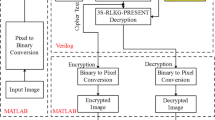Abstract
The messages in the latest security protocols such as IPSec, TLS and SSL must be handled by high-speed crypto systems. Current computationally extensive cryptographic implementations on different platforms such as software, Application Specific Integrated Circuit (ASIC) and Field Programmable Gate Array (FPGA) without adequate optimization achieve lesser throughput than should be possible. In the paper we consider a cryptographic hashing algorithm KECCAK and its implementations. To achieve better throughput, the proposed implementations of KECCAK explores FPGA design spaces. In this paper three different architectures for KECCAK coprocessor are implemented in Artix-7 (XC7A100T, CSG324) FPGA platform. The Processing Element (PE) handles all communication interfaces, data paths and control signals hazards of Network Security Processor (NSP). A partitioned area in the system ensures that the processor data path is completely isolated from secret key memory. The memory to KECCAK core communication is done by Direct Memory Access Controller (DMA). The performances of the implemented KECCAK are better in terms of throughput and resource usage than the existing work reported in the literature.
Access this chapter
Tax calculation will be finalised at checkout
Purchases are for personal use only
Similar content being viewed by others
References
Provelengios, G., Kitsos, P., Sklavos, N., Koulamas, C.: FPGA-based design approaches of keccak hash function. In: 2012 15th Euromicro Conference on Digital System Design, pp. 648–653, September 2012
Kerckhof, S., Durvaux, F., Veyrat-Charvillon, N., Regazzoni, F., de Dormale, G.M., Standaert, F.-X.: Compact FPGA implementations of the five SHA-3 finalists. In: Prouff, E. (ed.) CARDIS 2011. LNCS, vol. 7079, pp. 217–233. Springer, Heidelberg (2011). https://doi.org/10.1007/978-3-642-27257-8_14
Latif, K., Rao, M.M., Mahboob, A., Aziz, A.: Novel arithmetic architecture for high performance implementation of SHA-3 finalist keccak on FPGA platforms. In: Choy, O.C.S., Cheung, R.C.C., Athanas, P., Sano, K. (eds.) ARC 2012. LNCS, vol. 7199, pp. 372–378. Springer, Heidelberg (2012). https://doi.org/10.1007/978-3-642-28365-9_34
Akin, A., Aysu, A., Ulusel, O.C., Savaş, E.: Efficient hardware implementations of high throughput sha-3 candidates keccak, luffa and blue midnight wish for single- and multi-message hashing. In: Proceedings of the 3rd International Conference on Security of Information and Networks, SIN 2010, pp. 168–177. ACM, New York (2010)
Moreira, N., Astarloa, A., Kretzschmar, U., Lázaro, J., Molina, E.: Securing IEEE 1588 messages with message authentication codes based on the keccak cryptographic algorithm implemented in FPGAs. In: 2014 IEEE 23rd International Symposium on Industrial Electronics (ISIE), pp. 1899–1904, June 2014
Yalla, P., Homsirikamol, E., Kaps, J.P.: Comparison of multi-purpose cores of keccak and AES. In: 2015 Design, Automation Test in Europe Conference Exhibition (DATE), pp. 585–588, March 2015
Honda, T., Guntur, H., Satoh, A.: FPGA implementation of new standard hash function keccak. In: 2014 IEEE 3rd Global Conference on Consumer Electronics (GCCE), pp. 275–279, October 2014
Ahmed, K.E., Farag, M.M.: Hardware/software co-design of a dynamically configurable sha-3 system-on-chip (soc). In: 2015 IEEE International Conference on Electronics, Circuits, and Systems (ICECS), pp. 617–620, December 2015
Gaj, K., Homsirikamol, E., Rogawski, M., Shahid, R., Sharif, M.U.: Comprehensive evaluation of high-speed and medium-speed implementations of five SHA-3 finalists using xilinx and altera FPGAs. IACR Cryptology ePrint Archive 2012, p. 368 (2012)
Jungk, B., Apfelbeck, J.: Area-efficient FPGA implementations of the sha-3 finalists. In: 2011 International Conference on Reconfigurable Computing and FPGAs, pp. 235–241, November 2011
Winderickx, J., Daemen, J., Mentens, N.: Exploring the use of shift register lookup tables for keccak implementations on xilinx FPGAs. In: 2016 26th International Conference on Field Programmable Logic and Applications (FPL), pp. 1–4, August 2016
Michail, H.E., Ioannou, L., Voyiatzis, A.G.: Pipelined sha-3 implementations on FPGA: architecture and performance analysis. In: Proceedings of the Second Workshop on Cryptography and Security in Computing Systems, CS2 2015, pp. 13:13–13:18. ACM, New York (2015)
Peeters, M., Bertoni, G., Daemen, J., Van Assche, G.: Keccak sponge function family main document, April 2009. http://keccak.noekeon.org
Standaert, F.-X., van Oldeneel tot Oldenzeel, L., Samyde, D., Quisquater, J.-J.: Power analysis of FPGAs: how practical is the attack? In: Y. K. Cheung, P., Constantinides, G.A. (eds.) FPL 2003. LNCS, vol. 2778, pp. 701–710. Springer, Heidelberg (2003). https://doi.org/10.1007/978-3-540-45234-8_68
Gaspar, L., Fischer, V., Bossuet, L., Fouquet, R.: Secure extension of FPGA general purpose processors for symmetric key cryptography with partial reconfiguration capabilities. ACM Trans. Reconfigurable Technol. Syst. 5(3), 16:1–16:13 (2012)
Author information
Authors and Affiliations
Corresponding author
Editor information
Editors and Affiliations
Rights and permissions
Copyright information
© 2017 Springer Nature Singapore Pte Ltd.
About this paper
Cite this paper
Paul, R., Shukla, S.K. (2017). A High Speed KECCAK Coprocessor for Partitioned NSP Architecture on FPGA Platform. In: Kaushik, B., Dasgupta, S., Singh, V. (eds) VLSI Design and Test. VDAT 2017. Communications in Computer and Information Science, vol 711. Springer, Singapore. https://doi.org/10.1007/978-981-10-7470-7_50
Download citation
DOI: https://doi.org/10.1007/978-981-10-7470-7_50
Published:
Publisher Name: Springer, Singapore
Print ISBN: 978-981-10-7469-1
Online ISBN: 978-981-10-7470-7
eBook Packages: Computer ScienceComputer Science (R0)




